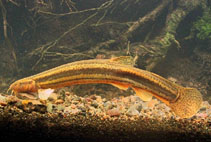| Family: |
Cobitidae (Spined loaches) |
| Max. size: |
30 cm TL (male/unsexed); 30.7 cm TL (female) |
| Environment: |
demersal; freshwater; brackish, potamodromous |
| Distribution: |
Europe and Asia: In Europe, north of the Alps, from Meuse eastward to Neva drainages and Lake Ladoga; northern Black Sea basin from Danube eastward to Kuban, absent on the southern section; Caspian basin in Volga and Ural drainages. Not native to Great Britain, Scandinavia, Apennine and Iberian peninsulas, Crimea, and Adriatic, Aegean and White Sea basins. Locally introduced in Rhône drainage (France) and perhaps elsewhere (Ref. 59043). |
| Diagnosis: |
Dorsal spines (total): 3-3; Dorsal soft rays (total): 5-6; Anal spines: 3-3; Anal soft rays: 8-11; Vertebrae: 49-50. Broad midlateral stripe from eye to caudal base and narrow stripe from opercle at least to pelvic origin. Lamina circularis absent in males (Ref. 59043). Caudal fin with 14-16 rays (Ref. 40476). |
| Biology: |
Found in lower reaches of slow-flowing rivers, but can also be found in still pools (Ref. 9696), on sandy bottoms of ponds, pools and ditches. Adults are nocturnal which burrow into mud during dry periods and strong frosts. Usually, burrows are 20-30 cm deep, occasionally down to 70 cm during dry periods (Ref. 59043). During the day, they stay buried in the sand. Feed on insect larvae and small mollusks. Seldom captured with hook and line (Ref. 30578). Are sensitive to pollutants which accumulate in the sediment (Ref. 11941). Facultative air-breathers (Ref. 27368). A female specimen measuring 30.7 cm TL was recorded from Netherlands (Ref. 114650). |
| IUCN Red List Status: |
Least Concern (LC); Date assessed: 16 January 2023 Ref. (130435)
|
| Threat to humans: |
harmless |
Source and more info: www.fishbase.org. For personal, classroom, and other internal use only. Not for publication.
